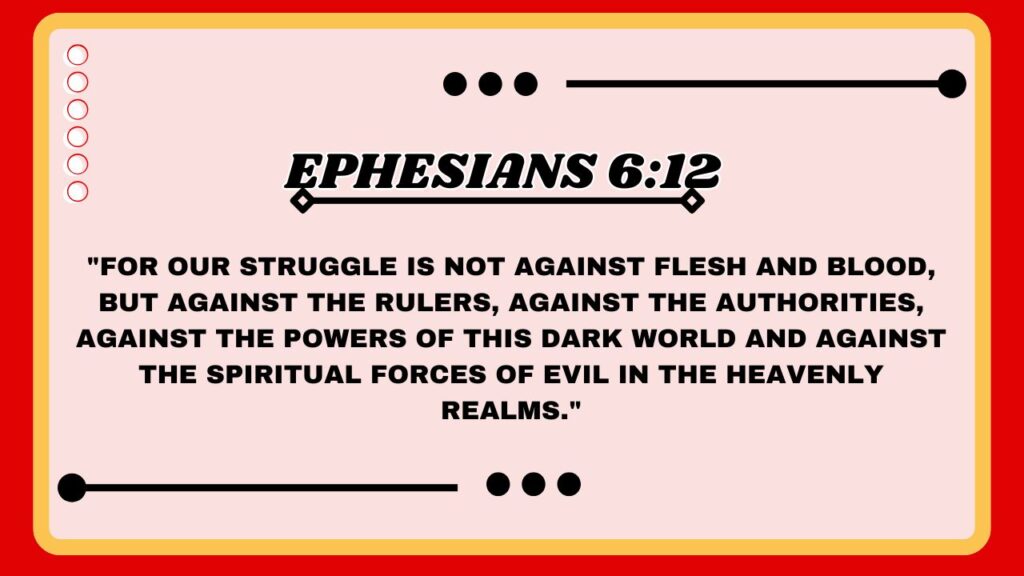Bible Verses About Enemies: In a world where conflict seems inevitable, Scripture provides divine wisdom on how to respond to those who oppose us. The Bible doesn’t shy away from addressing the reality of enemies in our lives whether they’re individuals who’ve wronged us, forces of spiritual opposition, or even our own destructive tendencies.
These 40 verses offer God’s perspective on handling adversity from others. Rather than promoting vengeance or harboring bitterness, biblical teaching consistently points us toward a higher path one of forgiveness, prayer, and entrusting justice to God.
Understanding how to respond to enemies biblically isn’t just about personal peace; it’s about reflecting Christ’s character in the most challenging relationships. These verses reveal a counterintuitive approach that has the power to transform both you and potentially your relationships with those who oppose you.
Also Read: 36 Important Bible Verses About Casting Out Demons
Loving Your Enemies
Matthew 5:44-45
“But I tell you, love your enemies and pray for those who persecute you, that you may be children of your Father in heaven. He causes his sun to rise on the evil and the good, and sends rain on the righteous and the unrighteous.”
Jesus delivers this revolutionary command in His Sermon on the Mount, directly challenging the cultural norms of His day. By instructing us to love and pray for our enemies, He reveals that God’s children should reflect their Father’s impartial love and grace rather than worldly patterns of retaliation.
Luke 6:27-28
“But to you who are listening I say: Love your enemies, do good to those who hate you, bless those who curse you, pray for those who mistreat you.”

Jesus expands on His teaching with specific actions that demonstrate love toward enemies. This verse calls us to actively seek the good of those who harm us a practice that breaks cycles of hatred and reflects God’s redemptive love toward sinners.
Romans 12:20-21
“On the contrary: ‘If your enemy is hungry, feed him; if he is thirsty, give him something to drink. In doing this, you will heap burning coals on his head.’ Do not be overcome by evil, but overcome evil with good.”
Paul quotes Proverbs while explaining how Christians should respond to enemies with practical kindness. The “burning coals” metaphor likely refers to creating an opportunity for your enemy to feel conviction and potentially experience a change of heart through your unexpected generosity.
Proverbs 25:21-22
“If your enemy is hungry, give him food to eat; if he is thirsty, give him water to drink. In doing this, you will heap burning coals on his head, and the LORD will reward you.”
The original proverb that Paul quotes shows this principle existed even in the Old Testament. This verse reveals that responding to enemies with kindness rather than vengeance is not only right but will be rewarded by God, who notices our obedience in difficult relationships.
1 Peter 3:9
“Do not repay evil with evil or insult with insult. On the contrary, repay evil with blessing, because to this you were called so that you may inherit a blessing.”
Peter reminds believers that blessing those who harm us is part of our spiritual calling. This countercultural response opens us to receiving God’s blessings in our own lives, creating a beautiful spiritual cycle that contrasts sharply with the worldly cycle of retaliation.
Also Read: 39 Bible Verses About Revival
Trusting God for Justice
Romans 12:19
“Do not take revenge, my dear friends, but leave room for God’s wrath, for it is written: ‘It is mine to avenge; I will repay,’ says the Lord.”
Paul instructs believers to resist the natural urge for personal vengeance. By stepping back from the role of judge and executioner, we create space for God to administer perfect justice according to His wisdom and timing.
Psalm 37:12-13
“The wicked plot against the righteous and gnash their teeth at them; but the Lord laughs at the wicked, for he knows their day is coming.”
The psalmist provides perspective on enemies who seem to prosper despite their evil intentions. This verse reminds us that God sees everything and will ultimately address wrongdoing, allowing us to find peace even when facing unjust opposition.
1 Samuel 24:12
“May the LORD judge between you and me. And may the LORD avenge the wrongs you have done to me, but my hand will not touch you.”
David spoke these words when he had the opportunity to kill King Saul, who was hunting him. His response demonstrates trust in God’s justice rather than taking matters into his own hands. We can follow David’s example by releasing our grievances to God rather than seeking personal revenge.
Psalm 35:1
“Contend, LORD, with those who contend with me; fight against those who fight against me.”

David’s prayer shows a healthy approach to handling enemies bringing our concerns directly to God rather than handling them ourselves. This verse teaches us to invite God into our conflicts and trust His protection rather than relying on our own strength or schemes.
Deuteronomy 32:35
“It is mine to avenge; I will repay. In due time their foot will slip; their day of disaster is near and their doom rushes upon them.”
This verse, quoted by Paul in Romans, establishes God’s role as the ultimate judge. Vengeance belongs to Him alone, which frees us from the burden of seeking retribution and allows us to focus on our own faithfulness regardless of how others treat us.
Praying for Enemies
Luke 23:34
“Jesus said, ‘Father, forgive them, for they do not know what they are doing.’ And they divided up his clothes by casting lots.”
Even while suffering crucifixion, Jesus exemplified His own teaching by praying for His executioners. This powerful moment reveals that no offense is beyond the scope of forgiveness and reminds us that many who harm us are spiritually blind to the consequences of their actions.
Acts 7:60
“Then he fell on his knees and cried out, ‘Lord, do not hold this sin against them.’ When he had said this, he fell asleep.”
Stephen, the first Christian martyr, followed Christ’s example by praying for his murderers. His dying prayer demonstrates that forgiving enemies isn’t just Jesus’s teaching but a practical possibility for believers filled with the Holy Spirit, even in the most extreme circumstances.
Psalm 109:4
“In return for my friendship they accuse me, but I am a man of prayer.”
David’s response to betrayal was not retaliation but turning to God in prayer. This verse encourages us to make prayer our first response when facing opposition, finding strength in our relationship with God rather than in revenge against enemies.
Jeremiah 29:7
“Also, seek the peace and prosperity of the city to which I have carried you into exile. Pray to the LORD for it, because if it prospers, you too will prosper.”
God instructed the Israelites to pray for Babylon the very nation that had conquered them. This teaches us to pray for the welfare of even those societies or systems that oppose us, recognizing that our well-being is often connected to the communities where God has placed us.
Matthew 5:39
“But I tell you, do not resist an evil person. If anyone slaps you on the right cheek, turn to them the other cheek also.”
Jesus teaches a radical non-retaliation that confounds worldly wisdom. Rather than prayer for direct protection, this verse encourages an attitude that refuses to participate in escalating cycles of retaliation, creating space for God to work in difficult relationships.
Also Read: 41 Important Bible Verses About Letting Go
Forgiveness and Reconciliation
Ephesians 4:32
“Be kind and compassionate to one another, forgiving each other, just as in Christ God forgave you.”
Paul grounds our forgiveness of others in God’s forgiveness of us through Christ. This verse reminds us that extending forgiveness to enemies is not optional but fundamental to living out the gospel we’ve received.
Matthew 6:14-15
“For if you forgive other people when they sin against you, your heavenly Father will also forgive you. But if you do not forgive others their sins, your Father will not forgive your sins.”

Jesus establishes a direct connection between receiving God’s forgiveness and extending forgiveness to others. This sobering teaching reminds us that harboring unforgiveness toward enemies creates a spiritual barrier between us and God’s grace.
Colossians 3:13
“Bear with each other and forgive one another if any of you has a grievance against someone. Forgive as the Lord forgave you.”
Paul instructs believers to pattern their forgiveness after Christ’s complete, sacrificial, and undeserved. This verse challenges us to extend the same grace we’ve received rather than demanding that enemies earn our forgiveness through changed behavior.
Proverbs 19:11
“A person’s wisdom yields patience; it is to one’s glory to overlook an offense.”
This proverb presents the ability to overlook offenses as a sign of wisdom and maturity. Rather than keeping score of every wrong, wise believers know when to simply let go of minor injuries for the sake of peace and their own spiritual well-being.
Matthew 18:21-22
“Then Peter came to Jesus and asked, ‘Lord, how many times shall I forgive my brother or sister who sins against me? Up to seven times?’ Jesus answered, ‘I tell you, not seven times, but seventy-seven times.'”
Jesus teaches that forgiveness should be unlimited rather than carefully measured. His answer challenges our tendency to set boundaries on forgiveness and reminds us that reconciliation requires ongoing commitment rather than a one-time decision.
Also Read: 36 Important Bible Verses About Karma
Wisdom in Dealing with Opposition
Proverbs 16:7
“When a man’s ways please the LORD, he makes even his enemies to be at peace with him.”
This proverb reveals that godly living can sometimes transform hostile relationships. While not guaranteeing universal approval, it suggests that focusing on pleasing God rather than winning arguments often leads to unexpected reconciliation.
Matthew 10:16
“I am sending you out like sheep among wolves. Therefore be as shrewd as snakes and as innocent as doves.”
Jesus acknowledges the reality of opposition while instructing His followers to combine wisdom with integrity. This verse teaches us to be strategically mindful when dealing with enemies without compromising our Christian character or resorting to deception.
Proverbs 15:1
“A gentle answer turns away wrath, but a harsh word stirs up anger.”
This proverb offers practical guidance for diffusing tension with opponents. By controlling our tone and choosing gentle responses rather than harsh comebacks, we can often prevent conflicts from escalating and create opportunities for understanding.
Romans 14:19
“Let us therefore make every effort to do what leads to peace and to mutual edification.”
Paul encourages believers to actively pursue peace rather than merely avoiding conflict. This verse reminds us that our interactions with difficult people should aim not just at preventing harm but at building up everyone involved, including those who oppose us.
Proverbs 20:22
“Do not say, ‘I’ll pay you back for this wrong!’ Wait for the LORD, and he will avenge you.”
This proverb warns against verbalizing threats of revenge. By patiently waiting for God to address wrongs, we avoid escalating conflicts and protect ourselves from the spiritual damage that comes from harboring vengeful thoughts.
Also Read: 39 Important Bible Verses About Long Life
Spiritual Warfare
Ephesians 6:12
“For our struggle is not against flesh and blood, but against the rulers, against the authorities, against the powers of this dark world and against the spiritual forces of evil in the heavenly realms.”

Paul reminds believers that human opponents often aren’t our true enemies. This perspective helps us respond with compassion to those who oppose us, recognizing they may be influenced by spiritual forces beyond their awareness.
2 Corinthians 10:3-4
“For though we live in the world, we do not wage war as the world does. The weapons we fight with are not the weapons of the world. On the contrary, they have divine power to demolish strongholds.”
Paul contrasts worldly and spiritual approaches to conflict. This verse teaches us to rely on spiritual weapons like prayer, truth, and faith rather than manipulation, force, or deception when facing opposition from enemies.
James 4:7
“Submit yourselves, then, to God. Resist the devil, and he will flee from you.”
James provides a two-part strategy for spiritual warfare submission to God followed by resistance to evil. This verse reminds us that successfully standing against our ultimate enemy requires both yielding to divine authority and actively opposing demonic influence.
1 Peter 5:8-9
“Be alert and of sober mind. Your enemy the devil prowls around like a roaring lion looking for someone to devour. Resist him, standing firm in the faith, because you know that the family of believers throughout the world is undergoing the same kind of sufferings.”
Peter warns believers about their spiritual enemy while providing encouragement for resistance. This verse reminds us to maintain spiritual vigilance, recognizing that opposition is a normal part of the Christian experience shared by believers worldwide.
Revelation 12:11
“They triumphed over him by the blood of the Lamb and by the word of their testimony; they did not love their lives so much as to shrink from death.”
John describes believers overcoming their ultimate enemy through Christ’s sacrifice and faithful witness. This verse teaches us that victory over opposition comes through relying on Christ’s work rather than our own strength and maintaining faithful testimony even under pressure.
Also Read: 47 Bible Verses About Being Set Apart (Explained)
Enemies in the Psalms
Psalm 18:48
“He delivers me from my enemies. You also lift me up above those who rise against me; You have delivered me from the violent man.”
David acknowledges God’s protection from physical enemies. This verse reminds us that while we may face opposition, God remains sovereign and capable of delivering us from those who seek to harm us.
Psalm 23:5
“You prepare a table before me in the presence of my enemies. You anoint my head with oil; my cup overflows.”
David describes God’s provision even while surrounded by enemies. This poetic image assures us that God can bless and sustain us even in hostile environments, demonstrating His power and care right in front of those who oppose us.
Psalm 27:1
“The LORD is my light and my salvation whom shall I fear? The LORD is the stronghold of my life of whom shall I be afraid?”

David finds courage in God’s presence despite facing enemies. This verse teaches us that understanding God’s protection helps us overcome fear of opposition and live with confidence even when threatened.
Psalm 31:15
“My times are in your hands; deliver me from the hands of my enemies, from those who pursue me.”
David entrusts his circumstances to God while facing pursuit. This verse models healthy dependence on God’s sovereignty rather than taking matters into our own hands when dealing with those who seek to harm us.
Psalm 119:98
“Your commands are always with me and make me wiser than my enemies.”
The psalmist finds practical wisdom through God’s Word that surpasses his opponents’ understanding. This verse reminds us that Scripture provides divine insight for navigating conflicts with enemies in ways that human strategies cannot match.
Inner Enemies
Galatians 5:16-17
“So I say, walk by the Spirit, and you will not gratify the desires of the flesh. For the flesh desires what is contrary to the Spirit, and the Spirit what is contrary to the flesh. They are in conflict with each other, so that you are not to do whatever you want.”
Paul describes the internal conflict between our spiritual nature and sinful desires. This verse reminds us that sometimes our greatest enemies are within requiring spiritual discipline and dependence on the Holy Spirit to overcome.
Romans 7:23
“But I see another law at work in me, waging war against the law of my mind and making me a prisoner of the law of sin at work within me.”

Paul acknowledges the struggle with his sinful nature. This honest assessment reminds us that recognizing our internal enemies is an important part of spiritual growth, preventing self-righteousness when dealing with external opposition.
James 4:1
“What causes fights and quarrels among you? Don’t they come from your desires that battle within you?”
James traces external conflicts back to internal desires. This verse teaches us that addressing our own selfish ambitions and unchecked desires is often the first step in resolving conflicts with others who oppose us.
Proverbs 25:28
“Like a city whose walls are broken through is a person who lacks self-control.”
This proverb uses a military metaphor to describe the danger of poor self-discipline. By comparing lack of self-control to a defenseless city, it reminds us that failure to manage our internal enemies leaves us vulnerable to external ones.
1 Corinthians 9:27
“No, I strike a blow to my body and make it my slave so that after I have preached to others, I myself will not be disqualified for the prize.”
Paul describes disciplining his own flesh to avoid disqualification. This verse teaches us that sometimes we must treat our own tendencies as enemies to be conquered through discipline rather than indulged through compromise.
Also Read: 37 Important Bible Verses About Discipline
Conclusion: Bible Verses About Enemies
These 40 Bible verses about enemies reveal God’s counterintuitive wisdom for handling opposition. Rather than following worldly patterns of retaliation and bitterness, Scripture consistently directs us toward love, prayer, forgiveness, and trust in God’s justice.
The biblical approach to enemies isn’t passive acceptance of wrongdoing but active engagement with a higher path one that reflects God’s character and creates opportunities for reconciliation. By responding to enemies according to these principles, we participate in God’s redemptive work rather than perpetuating cycles of conflict.
As you face opposition in your own life, remember that your response to enemies reveals more about your relationship with God than about those who oppose you. These verses offer a foundation for developing Christlike character even in your most challenging relationships, trusting that God’s ways lead to spiritual growth and potential healing of broken relationships.
Practical Applications
Here are some practical ways to apply these biblical principles when dealing with enemies:
- Create a prayer list of those who have wronged you, committing to pray for their well-being daily for 30 days
- Write a letter of forgiveness (that you may not send) to process your feelings toward someone who has hurt you
- Memorize key verses about enemies to recall when triggered by difficult encounters
- Practice “bless, not curse” by intentionally speaking positive words about those who oppose you
- Establish boundaries that protect you from harm while still allowing for potential reconciliation
- Keep a gratitude journal focused on lessons learned through difficult relationships
- Find a accountability partner who can help you process feelings about enemies in healthy ways
- Study biblical examples like Joseph, David, or Jesus to learn from their responses to opposition
- Recognize the difference between forgiveness (releasing the debt) and reconciliation (restoring the relationship)
- Seek counsel from mature believers when unsure how to apply these principles in complex situations
Frequently Asked Questions
Does forgiving my enemies mean I have to trust them again?
No, forgiveness and trust are separate issues. Forgiveness is a decision to release someone from the debt they owe you for wrongdoing, while trust is rebuilt over time through consistent trustworthy behavior. You can completely forgive someone while still maintaining healthy boundaries until they demonstrate changed behavior.
How can I love my enemies when they continue to hurt me?
Loving enemies doesn’t mean allowing abuse to continue. Biblical love seeks the highest good for others, which sometimes means establishing firm boundaries or even involving authorities in cases of illegal behavior. Pray for them, avoid revenge, and maintain a heart that hopes for their redemption but protect yourself from ongoing harm.
What if my enemy never changes or apologizes?
Your obedience to God’s commands about enemies isn’t dependent on their response. Jesus forgave those crucifying Him before they showed any remorse. Your forgiveness and prayers matter regardless of whether reconciliation occurs, and they free you from the spiritual burden of bitterness and resentment.
How do I balance forgiveness with justice?
Scripture doesn’t present these as contradictory. You can forgive someone personally while still supporting appropriate consequences for their actions. Romans 12:19 teaches us to leave vengeance to God, but this doesn’t preclude legal justice or natural consequences for wrongdoing.
Is it wrong to feel angry toward my enemies?
Anger itself isn’t sinful even Jesus displayed righteous anger. Ephesians 4:26 instructs, “In your anger do not sin.” The key is processing anger in healthy ways rather than allowing it to fester into bitterness or revenge. Acknowledge your feelings honestly before God while asking Him to help you respond according to His Word.
Read more knowledgeable blogs on Bible Aura

Piper McMillan is a passionate writer and educator dedicated to sharing the beauty and depth of the Bible. As the author behind the Piper McMillan website, she explores Bible verses, unlocks biblical narratives, and provides insights for living a Christ-centered life. Through warm, approachable, and inspiring articles, Piper guides readers to deepen their understanding of Scripture and apply its timeless wisdom to daily living. Her mission is to uplift, educate, and help others walk faithfully with God, rooted in His word.



